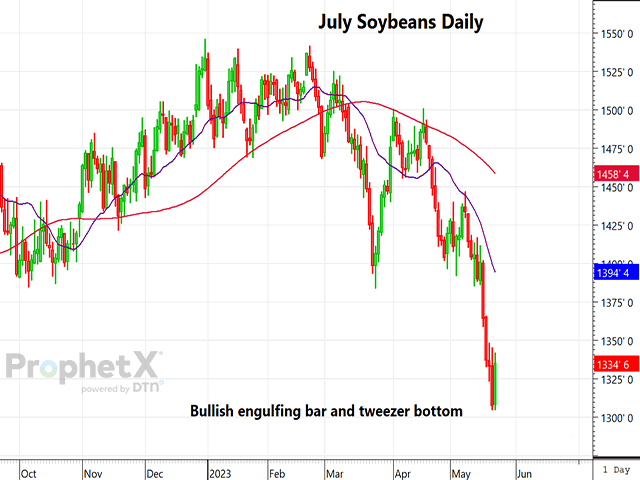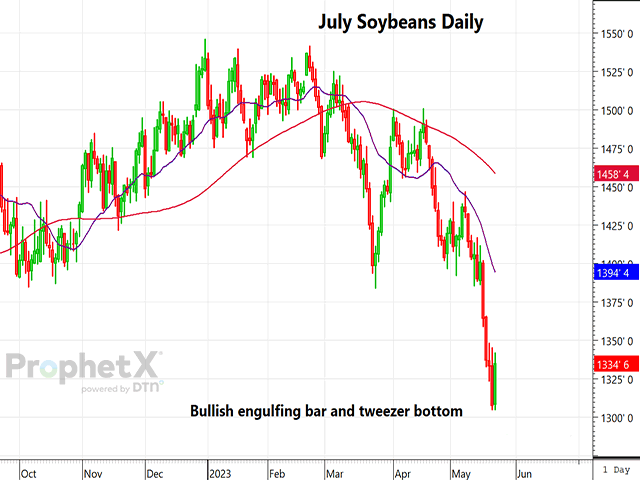Technically Speaking
July Soybeans Flashing Bullish Signals Early Monday
It is still early Monday, but after falling for four consecutive days last week by a total of nearly 96 cents per bushel, July soybeans are rallying sharply. In the process of today's up move, July has two possible bullish reversal signals on the daily chart -- but both come with contingencies.
The first is what is called a tweezer bottom. In Japanese candlestick charting, the tweezer is the equivalent of a double bottom with the same low for two straight days. The other signal -- for this we have to wait until the close -- is a possible bullish engulfing line or bar, where the range is wider than the previous day's candle, suggesting lower prices were rejected and selling has run dry. While the tweezer bottom looks to be set in stone, providing the market does not collapse by the close, the jury is still out on the second signal until the close.
For both of the bullish reversal signals, candlestick traders need to see a higher close on Tuesday to touch off a buy signal. It's probably not coincidental that the funds have exited all or most of their net-long positions to start Monday trade. Adding to the credence of these bullish signals is the fact that the July contract is reflecting strong cash demand and a 65-cent inverse to August.
P[L1] D[0x0] M[300x250] OOP[F] ADUNIT[] T[]
As in soybeans, the recent plunge in spot soymeal prices has been due to the once-large fund longs liquidating much of their length in meal, making it less likely that they'd be forced to sell. In addition to that, in the last few weeks we have seen sizable daily flash sales of soymeal -- one to Poland and one to the Philippines. That could very well be an indication of the U.S. picking up the slack from a likely sharp reduction in Argentina's soybean production. Many traders feel USDA is still overestimating the Argentine crop with some 70% of the harvest complete. Argentina's own exchanges are carrying production of 21.5 million metric tons (mmt) to 22.5 mmt compared to USDA's 27-mmt estimate. The former would make it much more likely that the U.S. will supplement lower Argentine meal exports.
July soymeal late last week came within a few dollars per ton of what looks like a major support area from $399 to $405, and the market is oversold. Another run to that area should find plenty of resting buy orders.
**
Comments above are for educational purposes only and are not meant as specific trade recommendations. The buying and selling of grain or grain futures or options involve substantial risk and are not suitable for everyone.
**
Register TODAY for the upcoming DTN Ag Summit Series event, "Crop Updates From the Field." We will visit with farmers from across the country, talk about the latest dicamba and pesticide news and discuss DTN's latest weather and market outlooks. The program begins Tuesday, May 23, at 8:30 a.m. CDT. We understand if you're too busy to attend live. It will be available for replay; however, you must register before midnight on Monday, May 22, to gain access. Registration is free, and you can find more details here: www.dtn.com/agsummit
Dana Mantini can be reached at Dana.Mantini@DTN.com
Follow him on Twitter @mantini_r
(c) Copyright 2023 DTN, LLC. All rights reserved.






Comments
To comment, please Log In or Join our Community .